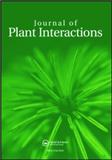
Journal of Plant Interactions
植物相互作用雜志
- 研究方向:生物
- 影響因子:1.839
- 官網(wǎng):http://www.tandfonline.com/toc/tjpi20/current
- 投稿地址:https://mc.manuscriptcentral.com/tjpi
- 審稿速度:>12周,或約稿
中文簡介
植物相互作用雜志是一本經(jīng)過同行評審的開放獲取期刊,廣泛發(fā)表研究,討論植物與周圍環(huán)境的相互作用。感興趣的主題包括:植物 - 植物相互作用植物 - 植物相互作用的所有生物化學,生理學和分子學方面都受到歡迎。植物 - 微生物相互作用三個基本分區(qū)涵蓋的最廣泛的部分之一:植物真菌;植物細菌和植物病毒相互作用。植物對微生物的反應和相互作用是了解群落動態(tài)和作物生產(chǎn)力的基礎,也是發(fā)現(xiàn)新的抗病蟲害基因的關鍵。植物 - 昆蟲相互作用該區(qū)域涉及相互作用的各個方面:從害蟲襲擊到植物吸引;從三營養(yǎng)相互作用到生物控制。數(shù)百萬年的食草動物捕食后植物的存在表明植物具有阻止食草動物攝食的能力。類似地,在植物毒素生物合成年齡之后存在食草動物是昆蟲食草動物可以抵消植物毒物的活生物證據(jù)。植物 - 動物相互作用該區(qū)域適用于所有關于放牧對植物種群和動態(tài)影響的研究。除昆蟲外,單胃動物和多胃食草動物與具有放牧活動的植物相互作用。植物 - 環(huán)境相互作用該區(qū)域分為兩個一般部分:“筆環(huán)境”和“失去環(huán)境”。第一部分涵蓋了植物與自然環(huán)境中存在的非生物脅迫(包括大氣現(xiàn)象,光照,溫度,污染等)相互作用的所有方面。第二部分的目的是收集有關地球和空間應用中植物生活的人工環(huán)境(包括溫室,生長室等)的研究報告。此處還涉及遙感和生物傳感。植物 - 土壤相互作用(包括植物 - 水相互作用)該區(qū)域涉及營養(yǎng),干旱,洪水,恢復,植物修復,生物修復,應用生態(tài)以及植物與土壤相互作用的所有方面。手稿應顯示現(xiàn)有知識的基本進展,并對植物相互作用生物學界有廣泛的興趣。必須提供明確的生物學意義和植物相互作用的解釋。結果應得到健全的統(tǒng)計分析的支持。將優(yōu)先考慮提供證據(jù)的手稿,以高度確定性和清晰度回答重要問題。該雜志對所有植物生物學家,植物生理學家,生態(tài)學家,真菌學家,微生物學家,農(nóng)學家,景觀設計師,環(huán)境工程師,昆蟲學家,學生以及所有對生物斗爭和自然資源的可持續(xù)利用感興趣的研究人員具有重要意義。
英文簡介
Journal of Plant Interactions is a peer reviewed open access journal, broadly publishing research that discusses interactions of plants with their surrounding environment. Subjects of interest include: Plant-Plant Interaction All biochemical, physiological and molecular aspects of plant-plant interactions are welcomed. Plant-Microorganism Interaction One of the widest sections covered by three fundamental sub-areas: Plant-Fungi; Plant-Bacteria and Plant-Virus Interactions. Responses to and interactions of plants with micro-organisms are the basics for understanding community dynamics and crop productivity, as well as the key to discovering new resistance genes for pest and disease attacks. Plant-Insect Interaction This area deals with all aspects of interaction: from pest attack to plant attraction; from tritrophic interactions to biological control. The presence of plants after millions of years of herbivore predation demonstrates plants have the ability to deter herbivore feeding. Similarly, the presence of herbivores after ages of plant toxin biosynthesis is the living evidence that insect herbivores can counteract plant poisons. Plant-Animal Interaction This area is intended for all studies concerning the effect of grazing on plant population and dynamics. Besides insects, monogastric and polygastric herbivores interact with plants with grazing activity. Plant-Environment Interaction This area is divided into two general sections: ‘pen environment’ and ‘losed environment’. The first section covers all aspects of plants’ interaction with abiotic stresses present in the natural environments (including atmospheric phenomena, light, temperature, pollution, etc.). The aim of the second section is to collect research reports on artificial environments where plants live (including greenhouses, growth chambers, etc.) both on Earth and in space applications. Remote sensing and biosensing are also covered here. Plant-Soil Interaction (including Plant-Water Interaction) This area deals with nutrition, drought, flooding, restoration, phytoremediation, bioremediation, applied ecology, and all aspects where plants interact with the soil. Manuscripts should show fundamental advances to existing knowledge and be of wide interest to the plant-interaction biology community. It is essential that a clear biological meaning and interpretation of the plant interaction is provided. Results should be supported by a sound statistical analysis. Preference will be given to manuscripts presenting evidence that answers important questions with a high degree of certainty and clarity. The Journal is of significance to all plant biologists, plant physiologists, ecologists, mycologists, microbiologists, agronomists, landscape architects, environmental engineers, entomologists, students and all researchers interested in biological struggle and sustainable use of natural resources.
近年期刊自引率趨勢圖
JCR分區(qū)
| JCR分區(qū)等級 | JCR所屬學科 | 分區(qū) | 影響因子 |
| Q1 | PLANT SCIENCES | Q1 | 4.029 |
近年期刊影響因子趨勢圖
CiteScore數(shù)值
| CiteScore | SJR | SNIP | 學科類別 | 分區(qū) | 排名 | 百分位 |
| 7.40 | 0.823 | 1.358 | 大類:Agricultural and Biological Sciences 小類:Plant Science | Q1 | 38 / 482 |
92% |
| 大類:Agricultural and Biological Sciences 小類:Ecology, Evolution, Behavior and Systematics | Q1 | 56 / 687 |
91% |
相關生物SCI期刊推薦
- MonthlyINTERNATIONAL JOURNAL OF BIOLOGICAL MACROMOLECULES
- Frontiers in Genetics
- BimonthlyMolecular Plant
- Frontiers in Microbiology
- BimonthlyBRIEFINGS IN BIOINFORMATICS
- BimonthlyCELLULAR AND MOLECULAR BIOLOGY
- SemimonthlyCELLULAR AND MOLECULAR LIFE SCIENCES
- Frontiers in Plant Science
- MonthlyMOLECULAR BIOLOGY AND EVOLUTION
- MonthlyJournal of Genetics and Genomics
